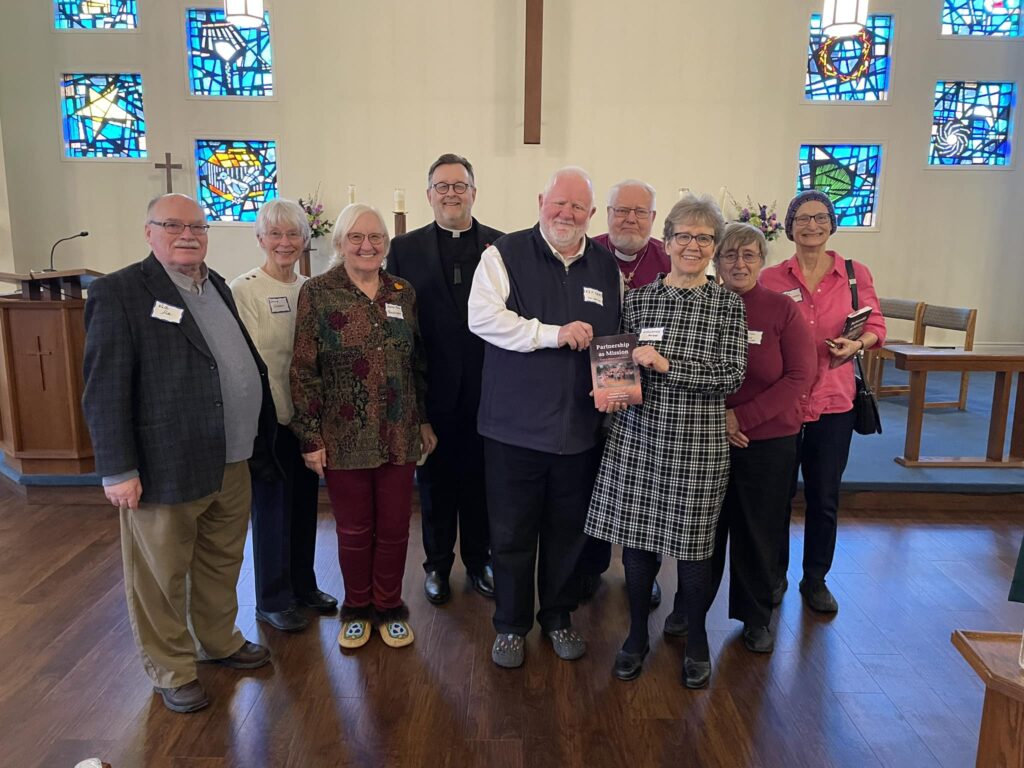 Anglican Deacon Maylanne Maybee is an author, educator and a triple Trinity College graduate BA ’71, MDiv ’82, DDHon’16 whose career has included significant involvement nationally and internationally.
Anglican Deacon Maylanne Maybee is an author, educator and a triple Trinity College graduate BA ’71, MDiv ’82, DDHon’16 whose career has included significant involvement nationally and internationally.
Her Trinity connections extend even beyond her own studies. As the wife of the Dean of Men, John Whittall, she lived at the College until 1985, which included raising their two small sons and hauling them, their baby equipment, and their groceries up all those stairs in Henderson Tower.
Taking a break from Trinity, Maylanne studied for a DipTheol in Oxford, living in the Orthodox house of St. Gregory and St. Macrina before returning to complete an MDiv, with allowance made for the work she had already done, and for her child-rearing time.
Raised as a woman of faith and an internationalist, Maylanne spent much of her childhood abroad. Her parents were in China when she was conceived (hence her Chinese name). Furthermore, her father John Maybee (Trinity 3T9) was Ambassador to Lebanon in 1967 when Maylanne had to leave school there because of civil war, and those experiences shaped her beliefs and her faith.
A life-long advocate for a revised diaconate, Maylanne was a member of the Anglican-Lutheran International Commission which produced the Hanover Report on the Diaconate.
Maylanne recently wrote, “My vision for a renewed diaconate is that it will help us become a Diaconal Church, a vulnerable and involved church that uses our resources for the common good, that brings our deep gladness to the places of the world’s deep hunger – for economic justice, racial justice, gender justice, for peace, for the reconciliation of peoples, for care of the Earth, our island home. May it be so.” (Consensus, 2022)
Over her career, Maylanne served on the staff of the General Synod and led two theological colleges. Now retired, she lives in Montreal. While visiting Toronto this year to promote her new book, Partnership as Mission, she spoke with fellow Trinity alum Rev. Canon Alyson Barnett-Cowan.
Alyson: What stands out for you from your time in Arts at Trinity?
Maylanne: The life in chapel, definitely. Howard Buchner’s spare way of presiding; Derwyn Owen’s sermons – his 3-point sermons without notes; learning to speak properly in the chapel; the choir. Once, while listening to Jesu, Joy of Man’s Desiring in that Chapel, I had a moment of recommitment to the faith, realizing that it was bigger than intellectual constructs.
Alyson: And what about your time in the Faculty of Divinity? What are your stand-out memories from that time?
Maylanne: Having a one-on-one tutorial in Old Testament with Matt Newby; the quality and stimulation of my classmates – even more than the faculty; the ability to do spiritual reflection on my studies; the access to the Toronto School of Theology. I wrote my thesis on the origins of the diaconate.
Alyson: You were ordained as a deacon, and you have stated that you were drawn by the practical role of deacons in the local community. Please tell me about that.
Maylanne: I had sense of call to be a deacon, not a priest. I had some ambivalence about women’s ordination when it seemed like self-promotion. Alison Kemper inspired me to be involved with the restoration of the diaconate. It exemplifies ministry without subservience, and ministry beyond the altar. Having lived in the Middle East I was struck by the disparity and injustice there and had a call to address disparity and injustice in Canada.
Alyson: What stands out for you from your early days in ordained ministry?
Maylanne: Graham Cotter was an important mentor for me. For awhile, I was Deacon in charge in St. Mark’s Parkdale, running the parish and engaged in broad ecumenical work in the Parkdale neighbourhood. I was with the Urban Core Support Network. There was a lot of analysis and on the ground engagement in housing issues, and constant grant-writing; it was bottom up but unstable work.
Alyson: Most of your career after that was in education of various kinds.
Maylanne: Yes. I worked for the General Synod from 1998 as Coordinator for Mission and Justice Education. I was responsible for preparing the resource ‘Praying with our Partners’ and worked with various ecumenical justice networks. Outside of work I focused my efforts with the Associated Parishes for Liturgy. Then I was director of the Centre for Christian Studies in Winnipeg from 2011-2017, and principal of United Theological College in Montreal from 2018-2021.
Alyson: What would you like to have learned at Trinity to prepare you for the work you ended up doing?
Maylanne: I would have liked to have learned more about liturgy and mission, and about the theology of prayer book revision. The link between liturgy and mission could have been developed better. For my goals, there was too much emphasis on being a priest.
The important work that Trinity can continue to do is to encourage continuing education – online courses and conferences. Trinity is a great resource for that type of connection and learning. It can encourage people to follow their own passion and vocation and make a difference within and outside the Church as people of faith.

The event was hosted by the Parish of St Simon, Oakville and its incumbent, Malcolm French ’84. Photo by Dorothy Peers.
